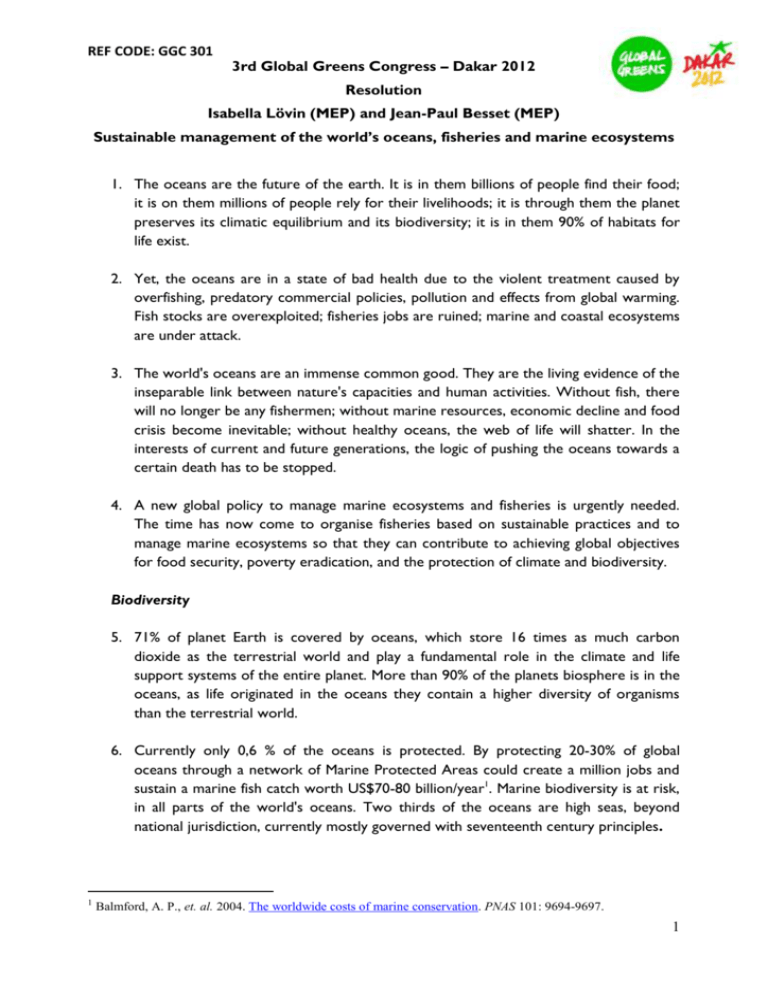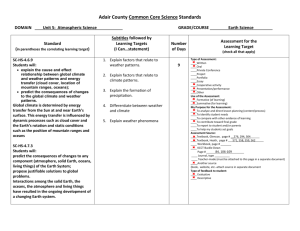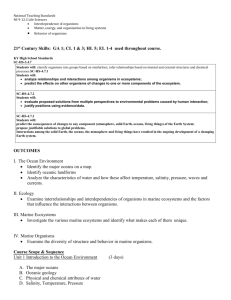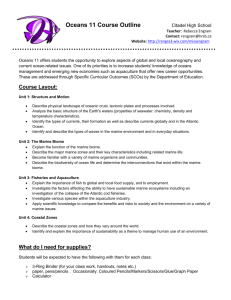Draft resolution for Dakar - Solving the global fisheries
advertisement

REF CODE: GGC 301 3rd Global Greens Congress – Dakar 2012 Resolution Isabella Lövin (MEP) and Jean-Paul Besset (MEP) Sustainable management of the world’s oceans, fisheries and marine ecosystems 1. The oceans are the future of the earth. It is in them billions of people find their food; it is on them millions of people rely for their livelihoods; it is through them the planet preserves its climatic equilibrium and its biodiversity; it is in them 90% of habitats for life exist. 2. Yet, the oceans are in a state of bad health due to the violent treatment caused by overfishing, predatory commercial policies, pollution and effects from global warming. Fish stocks are overexploited; fisheries jobs are ruined; marine and coastal ecosystems are under attack. 3. The world's oceans are an immense common good. They are the living evidence of the inseparable link between nature's capacities and human activities. Without fish, there will no longer be any fishermen; without marine resources, economic decline and food crisis become inevitable; without healthy oceans, the web of life will shatter. In the interests of current and future generations, the logic of pushing the oceans towards a certain death has to be stopped. 4. A new global policy to manage marine ecosystems and fisheries is urgently needed. The time has now come to organise fisheries based on sustainable practices and to manage marine ecosystems so that they can contribute to achieving global objectives for food security, poverty eradication, and the protection of climate and biodiversity. Biodiversity 5. 71% of planet Earth is covered by oceans, which store 16 times as much carbon dioxide as the terrestrial world and play a fundamental role in the climate and life support systems of the entire planet. More than 90% of the planets biosphere is in the oceans, as life originated in the oceans they contain a higher diversity of organisms than the terrestrial world. 6. Currently only 0,6 % of the oceans is protected. By protecting 20-30% of global oceans through a network of Marine Protected Areas could create a million jobs and sustain a marine fish catch worth US$70-80 billion/year1. Marine biodiversity is at risk, in all parts of the world's oceans. Two thirds of the oceans are high seas, beyond national jurisdiction, currently mostly governed with seventeenth century principles. 1 Balmford, A. P., et. al. 2004. The worldwide costs of marine conservation. PNAS 101: 9694-9697. 1 REF CODE: GGC 301 3rd Global Greens Congress – Dakar 2012 Resolution Isabella Lövin (MEP) and Jean-Paul Besset (MEP) Sustainable management of the world’s oceans, fisheries and marine ecosystems 7. Deep-sea biodiversity is particularly vulnerable, as many deep-sea organisms live long, mature late and reproduce very slowly; characteristics that make them particularly vulnerable to exploitation. Most deep-sea species lack any kind of protection. Climate Change 8. Consequences of global warming on oceans will be quite dramatic, including changes to ocean currents, natural habitats, marine food webs and ocean chemistry. Degradation of marine and coastal ecosystems leads to loss of carbon sequestration capacity. However it is currently not recognized as a significant driver of climate change, and is therefore not mitigated. By preventing the further loss of these ecosystems and catalyzing their recovery, we can contribute to offsetting 3–7% of current fossil fuel emissions in two decades – over half of that projected for reducing rainforest deforestation. 2 9. As the ocean becomes more acidic due to the increased uptake of carbon dioxide, many marine organisms will face changes. For instance, coral reefs will be affected through reduced capacity to form coral skeletons. Shellfish such as crabs and shrimps will find it more difficult to form shells. As these shellfish form a large part of the basis in the marine food web, this will have severe consequences also for other animals. 10. Climate change will lead to new developments in the Arctic and the Antarctic as marine resources will change distribution patterns and previously unavailable resources – notably hydrocarbons, minerals and fish – will become technically available. As the ice cover decreases, the need for sustainable management of resources under the current ice cover grows more and more urgent. Fish - the future of humanity 11. In 2007, fish accounted for 15.7% of the global human population’s intake of animal protein and 6.1% of all protein consumed by humans. 500 million people worldwide depend, directly or indirectly, on fisheries and aquaculture for their livelihoods. Fish provide at least 50% of animal protein to 400 million people in the poorest countries3. As fish dependency in low-income food deficient countries is high, the recovery of global fisheries to above healthy levels is a potential key tool for reaching development 2 Nellemann, C., et. al. 2009. Blue Carbon. A Rapid Response Assessment. UNEP, FAO and UNESCO. 3 FAO. 2010. The State of World Fisheries and Aquaculture (SOFIA). FAO, Rome. 2 REF CODE: GGC 301 3rd Global Greens Congress – Dakar 2012 Resolution Isabella Lövin (MEP) and Jean-Paul Besset (MEP) Sustainable management of the world’s oceans, fisheries and marine ecosystems targets. Much of the fisheries products produced in developing regions in the world are exported to the developed world, often with consequences such as endangering food security, job losses and environmental degradation. Fisheries 12. After 60 years of modern industrial fishing as we know it today, the reach and intensity of the global fishing fleets has now seriously affected virtually all marine areas, and also expanded more than 2000 meters into the deep oceans. Globally, the UN Food and Agriculture Organisation (FAO) consider 32% of fish stocks to be overexploited, depleted or recovering from depletion. 53% are fully exploited and 15% underexploited or moderately exploited. In the last fifty years, the global oceans have lost 90 percent of large predatory fish, reflecting the rapid spatial and taxonomic expansion of modern industrial fisheries.4 13. Fishing operations result in various degrees of environmental degradation. Fishing reduces the abundance of the target species, it results in by-catch of undersized individuals and unwanted species and it has serious impacts on marine habitats and species. Some fishing practices can be very destructive, such as bottom trawling on coral reefs or other sensitive bottom habitats. 14. While legal fishing methods may be destructive and lead to overfishing, the oceans are under further pressure by illegal, unreported and unregulated fishing (IUU), presently accounting for at least 15% of all marine catches worldwide. IUU has to be effectively prevented globally which only enhanced global cooperation can achieve. Exploitation and pollution 15. Oceans are under other pressures, including shipping activities, the disposal of wastes, pollution from oil spills and land based activities, deep-sea mineral exploration and exploitation of marine genetic resources. The world's remaining hydrocarbon reserves are to a significant extent situated under the seafloor, making the extraction potentially very environmentally destructive. 16. Our taste for plastics has filled the oceans with plastic debris, most of it smaller than five millimetres, now dispersed in all the worlds' oceans and far deep into the water column, entering and poisoning the marine food webs. 4 FAO. 2010. The State of World Fisheries and Aquaculture (SOFIA). FAO, Rome. 3 REF CODE: GGC 301 3rd Global Greens Congress – Dakar 2012 Resolution Isabella Lövin (MEP) and Jean-Paul Besset (MEP) Sustainable management of the world’s oceans, fisheries and marine ecosystems The world's oceans are in the public trust and as such are our common heritage that we have a responsibility to manage and hand over to the next generation. Responding to the urgent need for efficient global ocean governance, we propose that the Global Greens demand: 1. that all exploitation of the world's marine resources be demonstrably environmentally and developmentally sustainable, transparent and fair; 2. that bilateral agreements for states to access a coastal state’s fishery resource must be based on the UN Convention on the Law of the Sea (UNCLOS) provision of a scientifically established surplus, not utilised by the local population; 3. that priority actions for sustainable management of world oceans be made a priority at the Rio+20 summit; 4. that oceans be elevated to the highest levels of the UN system to enable a crosscutting approach and timely response to major threats and opportunities, including through the establishment of a UN Secretary-General or other high-level coordination mechanism on oceans as well as a UN Secretary-General “Ocean Budget” report, tracking and assessing ocean-related funding at the global level; 5. that depleted fish stocks be recovered to and maintained at levels well above those required to produce Maximum Sustainable Yield (MSY) by 2015, (as the world committed to in Johannesburg 2002), is of vital importance, and that restoring degraded marine ecosystems to healthy sustainable conditions be made a top global priority; recognising that the failure to do so seriously endangers global objectives for poverty and hunger eradication, biodiversity and ecosystem protection; 6. that the use of Marine Spatial Planning be promoted to ensure efficient ocean management with preference to securing good environmental status of the seas, as this is the precondition for any exploitation of marine resources; 7. that all States sign, ratify and implement UNCLOS, the UN Fish Stocks Agreement, the FAO Code of Conduct for Fisheries and the UN General Assembly resolutions for addressing deep-sea fish stocks; and that efficient protection, conservation and sustainable use of biodiversity in areas beyond national jurisdiction requires a new implementing agreement under UNCLOS; 4 REF CODE: GGC 301 3rd Global Greens Congress – Dakar 2012 Resolution Isabella Lövin (MEP) and Jean-Paul Besset (MEP) Sustainable management of the world’s oceans, fisheries and marine ecosystems 8. that efficient and progressive science-based global marine management is implemented and promoted; and that environmentally harmful subsidies be ended; 9. that serious, tough and continuous actions be taken on all levels to combat and eradicate IUU fishing; 10. that sustainable small-scale fisheries are promoted and protected so they can create more local jobs and be less environmentally destructive; 11. that a moratorium for exploitation of Arctic resources such as oil, gas and fish is established and the current moratorium for exploitation of Antarctic resources as enshrined in the Antarctic Treaty is respected; 12. that additional research into quantification of carbon sequestration and storage in and greenhouse gas emissions from key ecosystems is developed, with a focus on poorly researched ecosystems and their mitigation potential (for instance sea grass beds); 13. that the effectiveness of the institutional mechanisms is ensured, proper UN oversight and review mechanisms of ocean governance mechanisms are instituted, including for international conventions and Regional Fisheries Management Organisations; to expand them geographically to cover all the world's oceans, and to expand their powers to efficiently enforce management decisions and sanctions; 14. The speedy implementation of all actions implementing the Convention on Biodiversity Aichi targets, agreed in Nagoya 2010, to restore marine ecosystems, including establishing 10% of the marine and coastal areas as protected areas, end the losses of natural habitats and ensure that all marine and aquatic resources are managed and harvested sustainably by 2020. Submitted by: Isabella Lövin (Member of the European Parliament), isabella.loevin@europarl.europa.eu Jean-Paul Besset (Member of the European Parliament), jean-paul.besset@europarl.europa.eu 5 REF CODE: GGC 301 3rd Global Greens Congress – Dakar 2012 Resolution Isabella Lövin (MEP) and Jean-Paul Besset (MEP) Sustainable management of the world’s oceans, fisheries and marine ecosystems 6







